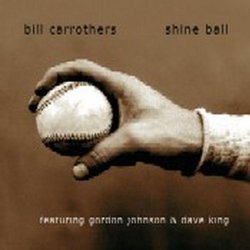All About Jazz review
MT | Princeton, NJ | 11/17/2008
(5 out of 5 stars)
"Allaboutjazz.com
John Kelman
2005 seems to be pianist Bill Carrothers' year. He's already released I Love Paris (Pirouet), a mainstream look at songs from the 1920's through the 1940s, and Civil War Diaries: Solo Piano (Illusions Music), where he took even greater liberties with American Civil War songs previously covered on The Blues and the Greys (Bridgeboymusic, 1997). The key to their success was Carrothers' liberal approach to the tunes--many of which may not be known by name, but feel familiar on an instinctive level.
Still, Carrothers' open-mindedness is nothing new to those familiar with earlier records like the dark trio record Ghost Ships (Sketch, 2003) and the sweepingly ambitious Armistice 1918 (Sketch, 2004)--one of last year's best albums. Shine Ball--an album almost entirely comprised of free improvisations--is a logical next step for Carrothers, a trio recording that affirms him as one of America's most sadly under appreciated talents.
Bassist Gordon Johnson's is equally undervalued, but in a career stretching back thirty years he's played with a breadth of artists from Maynard Ferguson and Chuck Mangione to Greg Brown. Dave King is best known as the drummer for The Bad Plus, but on albums by Craig Taborn and the freebop group Happy Apple he's shown capabilities that extend well beyond TBP's rather singular focus.
Free improvisation can often seem amorphous, but Carrothers, Johnson, and King prove it doesn't have to be. While their approach is different, the trio shares a similar ambition to pulling shape out of the ether that pianist Paul Bley did on his outstanding Not Two, Not One (ECM, 1999). Carrothers is less idiosyncratic, although in his use of prepared techniques he shares a similar belief that the instrument can be expanded well beyond its traditional confines. Similarly, King finds ways to take his drum kit beyond the norm, leaving Johnson as the only player whose instrument remains unaltered.
That's not to say that Shine Ball doesn't feel like a piano trio, but Carrothers' and King's explorations of expanded texture lend it a unique complexion. Still, the broadest palette in the world would mean nothing if it weren't for the trio's unerring chemistry. Whether mining the bleakest of territories on "Bourbon," where Carrothers proves there's beauty in darkness, or the aptly-titled "One Note Slamba," with Johnson and King pushing a fast swing over Carrothers' repeated triplet, there's an underlying sense of focus that makes this free music with a distinct purpose. "Data Has Feelings" is more jaggedly chaotic, but it's clear everyone is heading in one direction, equally so on "Millipede," sounding like a skewed version of Peanuts music, and "Maelstrom," which begins spaciously but ultimately moves to a place more appropriate to its name.
Free music involves risk by definition, but Carrothers demonstrates that a firm meeting of the minds can truly build something out of nothing. Shine Ball is spontaneous composition of the highest order--an album that, had it been released earlier, would no doubt have appeared on many of the year's top ten lists."

